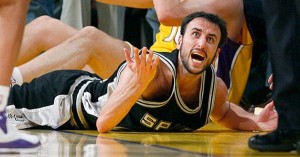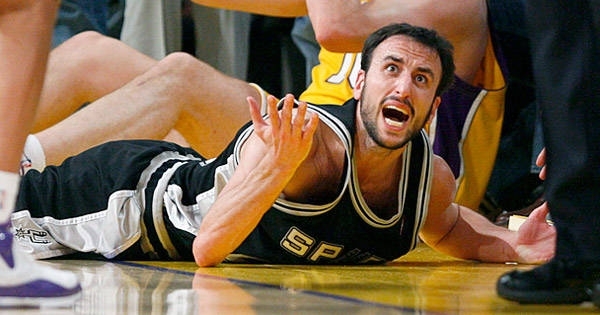The following article is a guest contribution by Benjamin Haynes, Esq. Haynes is a former Division 1 Basketball Player at Oral Roberts University and currently practices law in the State of Florida.
 Flopping. David Stern is fed up with it, as are all NBA fans. Flopping has undoubtedly taken away from the NBA game. The last few years it appears nearly all players are flopping to try and get the referee to make a call. What is flopping you ask? Flopping is the act of exaggerating contact to induce a foul call. Some NBA players have this “act” down to a science (i.e. Manu Ginobili and Vlade “the flop” Divac). The true essence of flopping was established in Europe. As more European and foreign players have entered the NBA, the development of flopping has spread like a bad plague.
Flopping. David Stern is fed up with it, as are all NBA fans. Flopping has undoubtedly taken away from the NBA game. The last few years it appears nearly all players are flopping to try and get the referee to make a call. What is flopping you ask? Flopping is the act of exaggerating contact to induce a foul call. Some NBA players have this “act” down to a science (i.e. Manu Ginobili and Vlade “the flop” Divac). The true essence of flopping was established in Europe. As more European and foreign players have entered the NBA, the development of flopping has spread like a bad plague.
Initially, flopping occurred when a defender was pretending or over exaggerating contact from an offensive player in order to entice the referee to make a charging call. However, flopping has progressed to include offensive players acting like a semi-truck is hitting them when they are driving to the basket. Flopping is officially out of control.
David Stern was quoted during last season’s NBA Finals stating, “If you continue to do this (flopping), you have to suffer some consequences…we want to put a stake in the ground that says that (flopping) is not something that we want to be part of our game, without coming down with a sledgehammer but just doing it in a minimalist way to begin stamping it out.”
The N.Y. Times recently reported that the NBA is deliberating the specifics on just what punishment will be imposed, and how it will be determined. The policy implemented will probably involve a post-game review, rather than an immediate decision by the referee. The N.Y. Times further reported that the penalty will most likely be a fine, and that the NBA is still deciding whether fines will increase with repeat offenders or not.
That leads to the question, should fines be imposed on professional athletes for in-game conduct that does not harm another athlete?
The NFL imposes penalties on players for in-game incidents such as helmet-to-helmet hits. For example, this week, Pittsburgh Steelers safety Ryan Mundy was fined $21,000 for his helmet-to-helmet hit that left Raiders receiver Darrius Heyward-Bey unconscious for several minutes Sunday in Oakland. While these fines have obviously not completely resolved the issue of helmet-to-helmet hits, the rule has deterred many players from taking a crack at another player on the field, in fear of being fined heavily. If these fines haven’t deterred a player initially, after a player is fined once, the player should be more reluctant to initiate another helmet-to-helmet impact in the future.
Like the NFL, the NBA is proposing to impose monetary fines on athletes for on-the-court conduct. The difference between the NFL’s reasoning and the NBA’s is rather important. The NFL imposes these fines in order to protect players’ safety; the NBA does so to protect the integrity of the game with relatively no potential player harm at issue. To fine NBA players for flopping during a game could potentially take away from the nature of the game more than flopping itself. The reason is this: what constitutes flopping in the NBA? There is no set standard for what would be deemed a “flop”. Players may be reluctant to step in and take a charge in fear that if they don’t receive heavy impact, and still fall, it could be deemed a flop. Fining could result in players over-thinking the naturally fast paced game, thus affecting performance.
There is a difference between an athlete falling a little farther because of a legitimate charge, and an athlete acting like he is having a seizure because another athlete is too close to him. This is where the discretion of the referee will come into play. The NBA is proposing that this new policy will involve a post game review, rather than an in-game ruling by referees. The NBA states that this is because it would be tough for a referee to make an in-game decision without the benefit of replay, and would place a greater burden on referees.
It doesn’t seem impossible for the NBA to implement a system in referee training where a referee can acknowledge a potential flop and call his or her other officials over to the scorers table to watch the replay to determine whether a flop has occurred. Then, a player would be assessed a technical foul and the opposing team would shoot a free throw. The issue here is time. It is foreseeable that if an in-game decision were to be made, it would take an extensive amount of time during the game. Referees reviewing flops during the game would potentially affect the tempo of the game in such a way that it would be detrimental to the game itself. However, if trained properly, the referees could habitually make these decisions quickly.
The NBA often gives players technical fouls for mouthing off to referees, and now with Rasheed Wallace allegedly attempting a comeback, that number could double. The principle of technical fouls could be applied for a player flopping as well. Both mouthing off and flopping take away from the integrity of the game, and both also lack the potential for causing player injury. It seems as if flopping fits into a technical foul category quite well. Further, if the NBA wants to impose a penalty against floppers in order to protect the NBA game, it would seem that imposing a fine would not establish the NBA’s purpose as well as a technical foul. A fine punishes the flopper without awarding the opposite team because of the flop. If a technical foul is called, it punishes the flopper and his team, while benefiting the other team with a free throw.
Something needs to be done about flopping in basketball. David Stern has identified the problem, but fining a player for in-game conduct that is not detrimental to the health of other players is extremely questionable to the integrity and nature of any sport.
